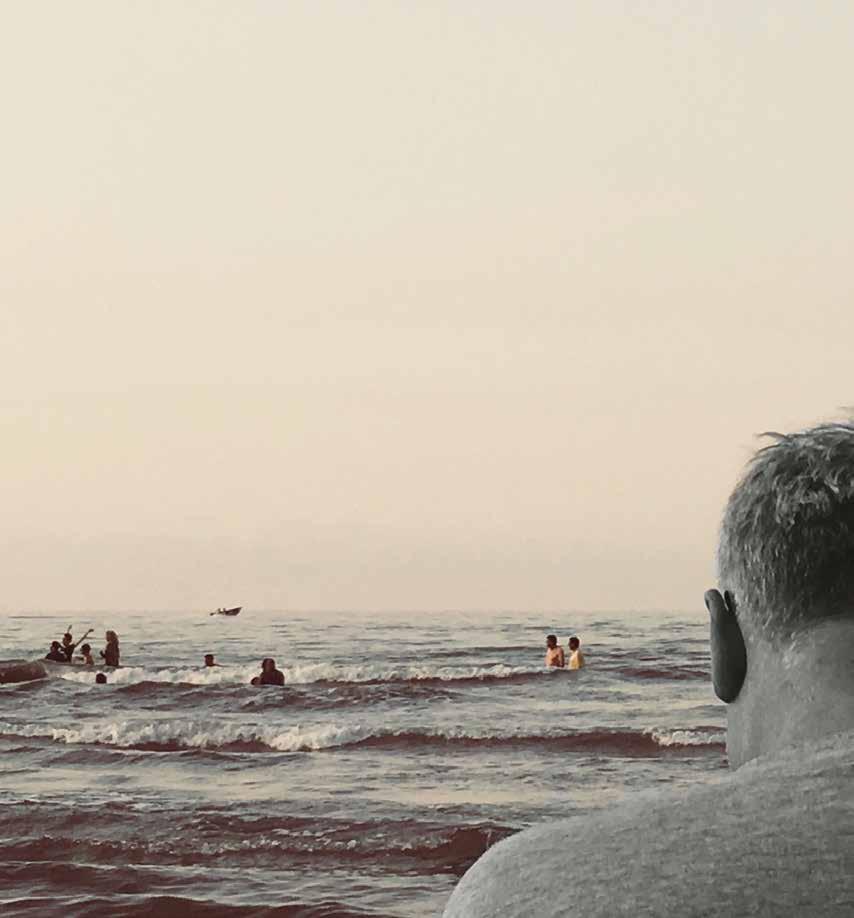
8 minute read
Paradise, We Have a Problem
by Tony Johnson
Advertisement
You ever talk to yourself like that? Why? Does it serve some useful purpose? Accomplish some beneficial outcome? Or, does it actually interfere with your intended goals? For some, an inner critic is so habitual that its ugliness is rarely noticed, it just seems like the “normal” way to respond to one’s mistakes. But that negativity actually harms us; it becomes a barrier to enjoying our lives by causing anxiety, depression, or the inability to relax. Extreme self-criticism engenders an urgent and impossible drive to find perfection, and when we don’t achieve it we express our disappointment in ourselves with irritability, anger, hostility, and unhappiness. We may think that those powerful condemnations result from the external circumstances of our life, and some do. But often, when we look closer, we’ll see they’re the consequence of how we TREAT OURSELVES in those life circumstances. Abusive self-talk may seem as natural as breathing, that it is a way to control, direct, or manage ourselves, and it is therefore unwise to turn it off. But occasionally, if we get a glimpse of its direct connection to our negative feelings about ourselves, we may see that it’s totally unfair, irrational, and cruel. The truth is that we are not only HARMING OURSELVES...we are inflicting collateral damage on others. It’s been said that “The mind is a dangerous neighborhood. Don’t go there alone.” But, when it’s the only neighborhood we’ve ever known, we may not even imagine there’s a different way of treating ourselves. And if we become cognizant of how we are treating ourselves, we may be in conflict; on one hand we want to be free of that brutal inner judge, but on the other, we don’t know how to develop a healthier relationship with ourselves. How did we get here in the first place?
THE CRADLE OF CRITICISM No infant is self-critical, self-destructive, or self-loathing; that is cognitively impossible. A child must have language (to call their self names with), a sense of self (with which to judge itself), and a list of readily available cognitive slams with which to bash themselves; none of which is possible until the child has developed thought language, which doesn’t occur until around 2½ to 3 years of age. Fortunately, most parents are so loving and gentle and nurturing with their “bundle of joy” that no matter how frustrated they may be, they bite their critical tongue. Others, however, are not so kind; later, as the child grows and more can be expected of them, criticizing them seems to be a legitimate and a useful way to help the child learn to behave as expected, and that becomes the primary way their parents communicate with them. Sure, kids can be tremendously annoying and parents do deserve compassion; they know that even though there are times when their child is lovably sweet and cooperative, they are not mature enough to be that way on a consistent basis. Even as they’re telling the child not to pull the dog’s tail, the child is pulling the tail; it takes a heroic amount of self-restraint to stay calm and realize that what went in the kid’s one ear, instantly came out the other.
HOW DOES SUCH PARENTAL CRITICISM BECOME SELF-CRITICISM? It is learned. We learn to judge ourselves by the same criteria by which we are judged. And that becomes who we ARE. Pity the poor child raised on put downs, fault
finding, and abuse. When the parents say, “How could you be so dumb?” it implies that not only was THIS action dumb, but WE are dumb. We DID something dumb because our intellect is seriously limited; we see ourselves as flawed and defective – dumb. Children exposed to those criticisms develop negative self-judgments, a mental “picture” of who they are, which can lead to a life of depression and misery. Unless they find a good mentor, they likely will continue their parents’ abuse by abusing themselves. Recall, we take in not just memory “tapes” (as they were quaintly called in another technical era) we take in BELIEFS. Even when a child hates the suffering inflicted by their parents’ verbal abuse, it becomes “normal” for them and they believe and internalize those views of themselves. After all, those critical judgments come from the most important, the most powerful people in their life; people who are perceived as being omnipotent and infallible. Those parental judgments become the fundamental core of our sense of self. It’s like gravity; ever present in absolutely every experience we ever have. And, like gravity, we don’t often see that our sense of self is there holding everything in its place. If our sense of self is based on negativity, our place becomes inferiority, inadequacy, worthlessness, and being unlovable. We may not even realize how ever-present and how deeply negative our identity is, until we furiously slam ourselves for some perceived flaw, attributing the mistake to some deep defect in our self. Like, spilling coffee becomes not a simple, single error, it becomes a catastrophic disaster; a definitive indicator of how thoroughly F’d up we are. So we react furiously to the minor mistake because it rubs our noses in WHO we think we are, “An idiot! A moron!”

If we stop to think about that, does such self-abuse really accomplish anything positive? We hated it when our parents did it to us, but like our parents, we’ve come to believe that harsh rebukes will motivate us to make the changes necessary to become someone we can like. Further, we unconsciously believe that such self-punishment will prevent us from making other similar errors in the future and, therefore, when we finally achieve that vaunted condition of perfection, we will be worthy of our own respect. So, the cycle continues and on, and on we go.
WHAT’S THE ACTUAL IMPACT? Imagine living in constant fear of a parent’s condemnations? Could someone living under the threat of constant scrutiny, awaiting the verbal ax to fall, always vigilant for the slightest hint of parental displeasure, not be affected? Wouldn’t the conviction that there was no permanent relief leave them hopeless, helpless, depressed? Well, it’s even worse when we are the critic and doing it to ourselves. A child can sometimes escape the anger of their parents in the companionship of understanding friends. But how do adults escape the critic who is ever-present inside themselves? How can they get the most satisfaction from life in Costa Rica, for example, when they’re rejecting and punitive toward the person living that life? Talk to anyone who’s moved here and you’ll learn all about the many, many mistakes they made, during and after the move; blunders which, when you think about it, were inevitable. Regardless of the preparations that they made, they just didn’t know what they didn’t know. So the mistakes taught them how things really work, and to make modifications to make it work. Those
40 El Residente adjustments are all the harder if we’re unforgiving and punitive about OUR OWN missteps. If those misunderstandings are taken as indicators of stupidity, of weaknesses, rather than seeing them as realities for everyone making such a big change, we’ll not be happy in our life here – or anywhere. Those who bash themselves anytime life becomes frustrating, and re-direct their anger onto family, friends, and Ticos (then bash themselves for being a jerk) are projecting their negative self-feelings onto others. That’s a no-win situation, right?
THE FLAW IN OUR APPROACH TO OUR FLAWS There are contradictions in trying to feel better about ourselves by brutalizing ourselves over our shortcomings. But over-the-top criticism doesn’t really motivate anyone to change for the better. We know instantly we’d never treat our children that way, so why would we treat ourselves like that? What it does is doom us into believing that self-esteem is impossible. Surely there must be something we can do to break the cycle? Yes there is! Learning patience, understanding, encouragement, things that may have been lacking from our upbringing, are the first steps. Thinking of it in a different way, it is being to ourselves the way we wish our parents had been to us. Last issue we looked at how some people want more and more physical possessions because they never feel they are “enough” in themselves. This time we considered how people may come to the CONVICTION that they’re deficient by engaging in way too much selfcriticism, believing it will finally move them into the “good enough” zone, when it actually digs them into a deeper hole of self-contempt. Tony Johnson is a retired university mental health center psychologist. He lives quite happily in Ojochal having left his inner critic back in the United States. For more information, you can write Tony at: johnson.tony4536@gmail.com
SHIP TO COSTA RICA

MAKING SHIPPING TO AND FROM NORTH AMERICA EASY
Our new California warehouse serves ALL the West Coast of the USA and Canada for shipment of large and small consignments – from cars and boats to building materials and household goods.
California Container Cargo Transfer 2364 E. Sturgis Rd #A Oxnard CA 93030 866-529-0497
Florida Pack and Stow 2310 S Dock Street H109 Palmetto FL 34221 866-531-0160

Main Office Ship To Costa Rica S.A. Alajuela, Costa Rica by the SJO airport 506-2431-1234 Toll free from USA 866-245-6923
shiptocostarica@ship506.com Partial or Full containers directly door to door from Canada and USA to Costa Rica. We pickup palletized shipments all over the USA Cars - Boats - Motorcycles - Quads - ATV's - Equipment - Lumber - Prefab Homes. Moving back to the USA ? We do that too! We are logistics consultants.









